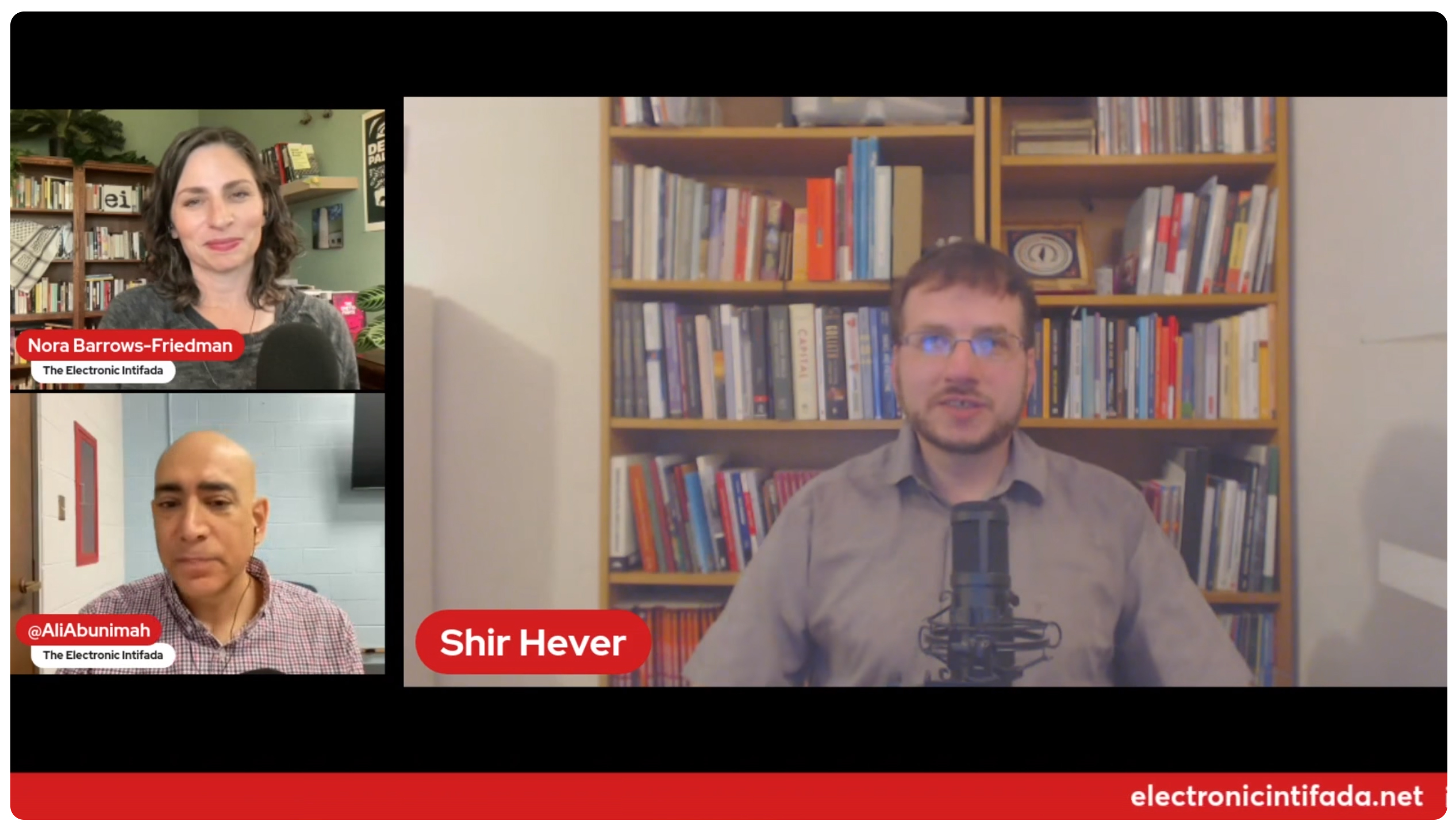More than eight months into its genocide, Israel is losing the war between its army and the resistance on the ground. Israel’s own economy is in shambles, as more and more Israelis leave abroad for good and its tech sector collapses.
“I think that what we’re seeing is, first of all, that this Israeli military doctrine has flown out the window,” political economist Shir Hever tells The Electronic Intifada Podcast.
“There is no doctrine right now – what we have is a collapse of Israeli society. It is a social collapse. It’s also psychological collapse, and it has to do with the fact that Israelis have lost connection with reality,” he adds.
Hever is the military embargo coordinator for the Palestinian Boycott Divestment and Sanctions National Committee (BNC) and works on its #ShutDownNation campaign. He lives in Germany and is the author of The Privatization of Israeli Security and The Political Economy of Israel’s Occupation.
Here follows his interview on the podcast…
Nora Barrows-Friedman: Good to see you, Shir. Palestinians in Gaza are victims of ongoing genocide perpetrated by Israel with broad support from the Israeli Jewish public. At the same time, there’s a military conflict between the Israeli army and the resistance on the ground, which Israel appears to be losing. Israel’s military doctrine has always been to fight short wars on the enemy’s territory, believing that as a small country, it cannot sustain long-term military mobilization. This current mobilization is its longest war ever. Shir, although you’re in Germany, can you give us your sense of how the Israeli public is faring right now? What are the main bases of support for this genocide and this war? Is the Israeli public able to cope with the effects of the war, both in terms of military casualties and other psychological and social impacts?
Shir Hever: Well, you’ve gotten right to the heart of it. I can’t answer all of this in one go, but let’s break it down and attack it from different directions. First, the Israeli military doctrine has flown out the window. There’s no doctrine right now. What we see is a collapse of Israeli society—a social and psychological collapse. Israelis have lost connection with reality. Even media outlets like Haaretz, which used to be more reliable, are now publishing fake news.
Israelis, for example, think that South Africa didn’t accuse Israel of genocide, a simple fact anyone can find out in one minute if they read English. Yet, even those who do read English prefer not to. So, on the military side, Israel has a much stronger military with a lot of weapons and international support. However, all that doesn’t matter if the side fighting is doing so with its eyes closed. Israel is killing indiscriminately without a clear strategy or goals. This is pure, unadulterated vengeance. Israelis know revenge has no chance of succeeding, and this knowledge is deeply embedded, especially among Jewish Israelis whose families came from Europe and who have stories of genocide running in their families.
Regardless of what Jews think about Germans or Nazis, they know that if they had attempted to exact vengeance against Germans for the Holocaust, there would never have been a state of Israel or a successful Zionist movement. Now, Israelis are talking about Zionism in the past tense. This has become mainstream in Israel, even among right-wing Israelis who support the genocide. They don’t support it because they think it will achieve something; they support it because they think the story is over and there’s no point in planning for the future.
Ali Abunimah: Do you think that applies to people like Itamar Ben-Gvir and Bezalel Smotrich, who are talking about settlements in Gaza?
Shir Hever: No, it doesn’t apply to them. They represent about 15% of the Jewish population in Israel—the national orthodox religious movement, which is highly messianic. They still believe that God will somehow save them. So, for them, it doesn’t matter if Israel is losing the war because they think this is just God testing them and there will be a divine intervention. However, this is less than 15% of the population. The other 85% of Jews in Israel who listen to Ben-Gvir and Smotrich realize that if this is the government’s stance, they better pack their bags and leave. And that’s what we’re seeing.
Nora Barrows-Friedman: The phrase “Zionism is being talked about in the past tense” really stood out. Can you elaborate on what you mean by that and what Zionism looks like now as a political ideology?
Shir Hever: I hope we also talk about the economic aspects, not just the ideological ones, though they are connected. There’s a generational divide. The older generation remembers the War of 1973, which was a trauma for Israeli society. Their understanding of Zionism involved planning for recovery from crises. They believed in the possibility of salvaging the settler colony and the apartheid system. Now, these older people, who are mainly pensioners, are the ones we see in demonstrations. Western media often portrays these demonstrations as vibrant democratic forces in Israel opposing Netanyahu. However, these are people in their mid-70s.
The younger generation of settler colonists believes they are entitled to their privileges without having to fight for them. This mindset is incompatible with the current crisis. Netanyahu has capitalized on this generational thinking, avoiding sacrifices and maintaining the status quo. This has led to a lack of discipline among soldiers and a widespread belief that the government has no plan, contributing to a sense of despair.
Ali Abunimah: Let’s shift now to the economic front, which is your expertise. What metrics are you using to assess the viability of Israel’s internal economic structure? Paint us a picture of what the state looks like right now.
Shir Hever: When we talk about the collapse of an exploitative and unequal apartheid economic structure, it’s a good thing. But it’s difficult to celebrate amid genocide. The economic collapse started in January 2023 with the new Israeli government. The far-right Messianic government showed no willingness to make compromises or plans for the future. We in the BDS movement started using the slogan “From Startup Nation to Shutdown Nation” and listed facts showing the decline in investments, debt, and other economic indicators. Israelis lining up for passports to leave the country became a common sight.
There are significant headlines, such as half a trillion shekels in local investments being shifted abroad. Israelis don’t believe in their own economy. This is a big story, but the real impact is what individuals believe. Economic crises happen in many countries, but when people lose faith in the future, they stop investing and start leaving. The micro-level impact is more critical.
Ordinary Israelis are dealing with soaring prices, hidden unemployment, and a healthcare system struggling due to doctors leaving the country. The government is housing evacuees from conflict areas in hotels, but this is unsustainable. Israel’s plan to upgrade its power grid has stalled due to material shortages, exacerbated by Turkey’s export bans and Colombia’s decision to stop coal exports. This could take Israel back to the Stone Age.
Ali Abunimah: You mentioned the collapse of the Israeli economy and the departure of many Israelis. What indicators or evidence have you seen about this exodus?
Shir Hever: It’s challenging to get precise statistics, but we know from various reports that many Israelis are seeking to leave the country. For example, the tourism section of a newspaper reported a net loss of a quarter of a million people through the airport. John Mearsheimer recently mentioned that this number might now be half a million. Countries like Cyprus are seeing a significant influx of Israelis, to the point where Hebrew is more commonly spoken than Greek in some towns.
Nora Barrows-Friedman: Can you talk about the impact of the Yemeni anti-genocide intervention and the blockade of ships bound for Israel?
Shir Hever: The blockade has severely affected Israel’s ports. Two of the world’s biggest shipping companies, Maersk and Hapag-Lloyd, have rerouted their ships around Africa, costing them billions. Chinese shipping companies are simply skipping Israeli ports. This has led to shortages of goods and increased prices, contributing to inflation. Israelis are using humor to cope, but the lack of understanding and acknowledgment of the reasons behind the blockade is evident.
Ali Abunimah: You mentioned earlier that regimes committing genocide do not survive. What does the collapse of Israel look like to you?
Shir Hever: I believe that Palestinians will decide what the future looks like. The outcome hinges on a ceasefire. If a ceasefire is achieved, it could lead to elections in Israel, exposing the lack of a viable majority among Zionist factions. This would open the door to a democratic alternative. Without a ceasefire, the scenario might involve the cessation of US military support, similar to what happened in South Vietnam or Afghanistan, leading to a rapid collapse.




